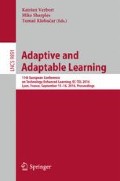Abstract
Learning by conceptual modeling is seeing uptake in secondary and higher education. However, assessment of conceptual models is underdeveloped. This paper proposes an assessment method for conceptual models. The method is based on a metric that includes 36 types of issues that diminish model features. The approach was applied by educators and positively evaluated. It was considered useful and the derived grades corresponded with their intuitions about the models quality.
Research co-funded by EU FP7, Project no. 231526, http://www.dynalearn.eu.
Access this chapter
Tax calculation will be finalised at checkout
Purchases are for personal use only
Notes
- 1.
Our method identifies 36 issue types, each with a unique number.
References
Bredeweg, B., Liem, J., Beek, W., Linnebank, F., Gracia, J., Lozano, E., Wißner, M., Bühling, R., Salles, P., Noble, R., Zitek, A., Borisova, P., Mioduser, D.: DynaLearn - an intelligent learning environment for learning conceptual knowledge. AI Mag. 34(4), 46–65 (2013)
Goberta, J.D., O’Dwyer, L., Horwitz, P., Buckley, B.C., Levy, S.T., Wilensky, U.: Examining the relationship between students’ understanding of the nature of models and conceptual learning in biology, physics, and chemistry. Int. J. Sci. Educ. 33(5), 653–684 (2011)
Harlen, W., James, M.: Assessment and learning: differences and relationships between formative and summative assessment. Assess. Educ. Principles Policy Pract. 4(3), 365–379 (1997)
Liem, J.: Supporting conceptual modelling of dynamic systems: a knowledge engineering perspective on qualitative reasoning, University of Amsterdam (2013). https://jochemliem.files.wordpress.com/2014/01/liem2013-thesisdigital.pdf
Songer, N.B., Ruiz-Primo, M.A.: Assessment and science education: our essential new priority? J. Res. Sci. Teach. 49(6), 683–690 (2012)
Author information
Authors and Affiliations
Corresponding author
Editor information
Editors and Affiliations
Rights and permissions
Copyright information
© 2016 Springer International Publishing Switzerland
About this paper
Cite this paper
Bredeweg, B., Liem, J., Nicolaou, C. (2016). Assessing Learner-Constructed Conceptual Models and Simulations of Dynamic Systems. In: Verbert, K., Sharples, M., Klobučar, T. (eds) Adaptive and Adaptable Learning. EC-TEL 2016. Lecture Notes in Computer Science(), vol 9891. Springer, Cham. https://doi.org/10.1007/978-3-319-45153-4_27
Download citation
DOI: https://doi.org/10.1007/978-3-319-45153-4_27
Published:
Publisher Name: Springer, Cham
Print ISBN: 978-3-319-45152-7
Online ISBN: 978-3-319-45153-4
eBook Packages: Computer ScienceComputer Science (R0)

